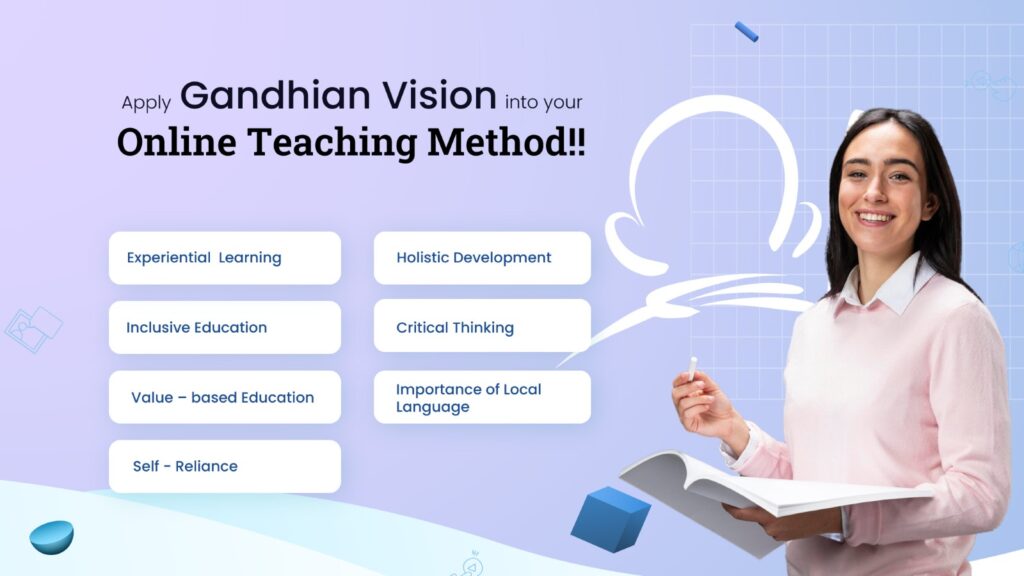
Have you ever wondered how Gandhian principles can inspire online teaching?!
As we celebrate Gandhi Jayanti, it’s a moment to reflect on how his vision for education can transform modern learning environments.
Gandhi emphasized holistic development, moral values, and community engagement, advocating for a teaching approach that nurtures not just the intellect but also the character of students. By integrating these timeless principles into online education, we can create enriching, inclusive, and impactful learning experiences that empower students to thrive in today’s world.
Experiential Learning
Learning should be rooted in real-life experiences rather than just theoretical knowledge!!
Interactive Projects: Incorporate project-based learning where students apply concepts to real-world challenges.
Reflective Practices: Encourage students to reflect on their experiences and share insights, fostering deeper understanding.
Value-Based Education
Education should establish moral and ethical values alongside academic knowledge!!
Community Service: Encourage participation in virtual community service projects that highlight social responsibility.
Character Development: Use storytelling and case studies to illustrate values like empathy, integrity, and respect.
Inclusive Education
Education should be accessible to everyone, breaking down barriers of caste, gender, and socio-economic status!!
Diverse Learning Materials: Use resources that reflect diverse cultures and perspectives, ensuring all students feel represented.
Accommodations: Provide various formats for learning materials to cater to different learning needs (videos, audio, text)
Self-Reliance
Education should empower students to be self-sufficient and develop practical skills!!
Encourage Independence: Assign projects that require students to explore topics independently and present their findings.
Resourcefulness: Teach students to utilize online tools and resources effectively, fostering a sense of autonomy.
Holistic Development
Education should nurture the mind, body, and spirit, promoting overall well-being!!
Mindfulness Practices: Incorporate mindfulness exercises or short breaks into your lessons to support mental well-being.
Creative Expression: Allow space for creative projects, such as art or music, to help students express themselves beyond academics.
Critical Thinking
Education should encourage questioning and independent thought, rather than passive acceptance of information.
Socratic Method: Use open-ended questions in discussions to stimulate critical thinking and debate among students.
Debate and Discussion Forums: Facilitate online forums where students can challenge ideas and engage in constructive discussions.
Importance of Local Languages
Education should be rooted in the local culture and language.
He emphasized the importance of teaching in one’s mother tongue to foster a sense of identity and belonging.
Language Instruction: Incorporate local languages in your curriculum, offering courses that teach students to read, write, and communicate effectively in their mother tongue.
Multilingual Resources: Provide learning materials in both local, national and international languages to support bilingual education and enhance comprehension.
In celebrating Gandhi Jayanti, we are reminded of the profound impact that Gandhian vision can have on education. By incorporating values such as experiential learning, ethical teaching, and the promotion of local languages, we can create a transformative online learning experience.
Wayvida serves as an excellent platform to bring these ideals to life. With its user-friendly interface and commitment to fostering community engagement, Wayvida empowers educators to implement Gandhian teachings effectively.
By leveraging this application, we can nurture a generation of students who are not only knowledgeable but also grounded in values that promote compassion and inclusivity.
Let’s work together to make online education a powerful tool for personal and societal growth, honoring Gandhi’s vision for a better world.
